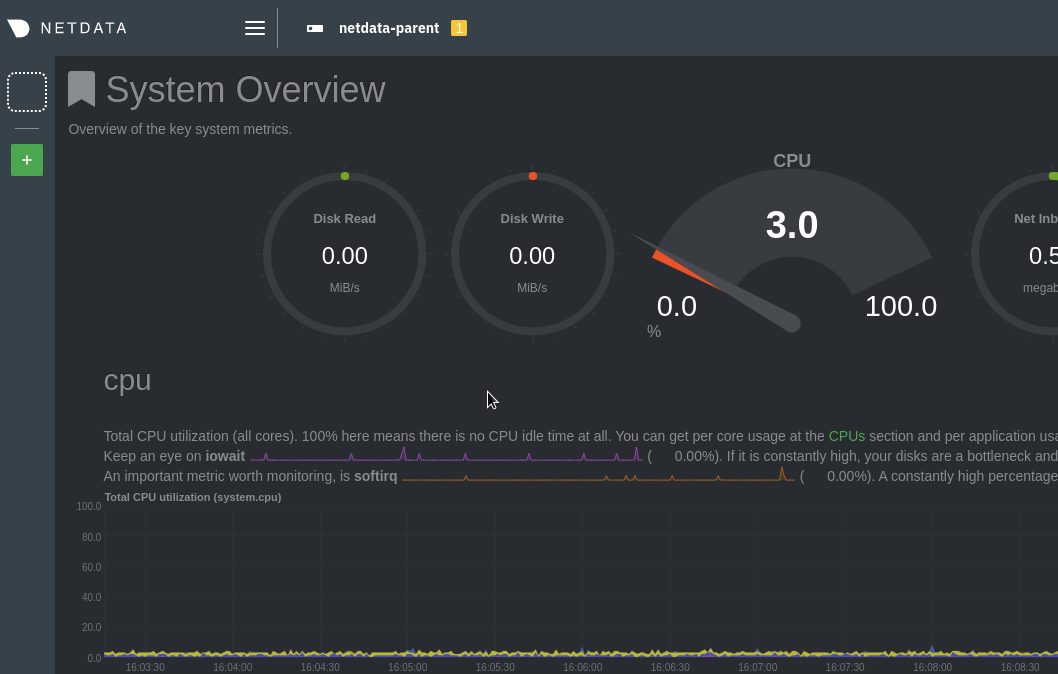Enable streaming between nodes
The simplest streaming configuration is replication, in which a child node streams its metrics in real time to a parent node, and both nodes retain metrics in their own databases.
To configure replication, you need two nodes, each running Netdata. First you'll first enable streaming on your parent node, then enable streaming on your child node. When you're finished, you'll be able to see the child node's metrics in the parent node's dashboard, quickly switch between the two dashboards, and be able to serve alarm notifications from either or both nodes.
Enable streaming on the parent node
First, log onto the node that will act as the parent.
Run uuidgen to create a new API key, which is a randomly-generated machine GUID the Netdata Agent uses to identify
itself while initiating a streaming connection. Copy that into a separate text file for later use.
Find out how to install
uuidgenon your node if you don't already have it.
Next, open stream.conf using edit-config
from within the Netdata config directory.
cd /etc/netdata
sudo ./edit-config stream.conf
Scroll down to the section beginning with [API_KEY]. Paste the API key you generated earlier between the brackets, so
that it looks like the following:
[11111111-2222-3333-4444-555555555555]
Set enabled to yes, and default memory mode to dbengine. Leave all the other settings as their defaults. A
simplified version of the configuration, minus the commented lines, looks like the following:
[11111111-2222-3333-4444-555555555555]
enabled = yes
default memory mode = dbengine
Save the file and close it, then restart Netdata with sudo systemctl restart netdata, or the appropriate
method for your system.
Enable streaming on the child node
Connect to your child node with SSH.
Open stream.conf again. Scroll down to the [stream] section and set enabled to yes. Paste the IP address of your
parent node at the end of the destination line, and paste the API key generated on the parent node onto the api key
line.
Leave all the other settings as their defaults. A simplified version of the configuration, minus the commented lines, looks like the following:
[stream]
enabled = yes
destination = 203.0.113.0
api key = 11111111-2222-3333-4444-555555555555
Save the file and close it, then restart Netdata with sudo systemctl restart netdata, or the appropriate
method for your system.
Enable TLS/SSL on streaming (optional)
While encrypting the connection between your parent and child nodes is recommended for security, it's not required to get started. If you're not interested in encryption, skip ahead to view streamed metrics.
In this example, we'll use self-signed certificates.
On the parent node, use OpenSSL to create the key and certificate, then use chown to make the new files readable
by the netdata user.
sudo openssl req -newkey rsa:2048 -nodes -sha512 -x509 -days 365 -keyout /etc/netdata/ssl/key.pem -out /etc/netdata/ssl/cert.pem
sudo chown netdata:netdata /etc/netdata/ssl/cert.pem /etc/netdata/ssl/key.pem
Next, enforce TLS/SSL on the web server. Open netdata.conf, scroll down to the [web] section, and look for the bind
to setting. Add ^SSL=force to turn on TLS/SSL. See the web server
reference for other TLS/SSL options.
[web]
bind to = *=dashboard|registry|badges|management|streaming|netdata.conf^SSL=force
Next, connect to the child node and open stream.conf. Add :SSL to the end of the existing destination setting
to connect to the parent using TLS/SSL. Uncomment the ssl skip certificate verification line to allow the use of
self-signed certificates.
[stream]
enabled = yes
destination = 203.0.113.0:SSL
ssl skip certificate verification = yes
api key = 11111111-2222-3333-4444-555555555555
Restart both the parent and child nodes with sudo systemctl restart netdata, or the appropriate
method for your system, to stream encrypted metrics using TLS/SSL.
View streamed metrics in Netdata's dashboard
At this point, the child node is streaming its metrics in real time to its parent. Open the local Agent dashboard for
the parent by navigating to http://PARENT-NODE:19999 in your browser, replacing PARENT-NODE with its IP address or
hostname.
This dashboard shows parent metrics. To see child metrics, open the left-hand sidebar with the hamburger icon
in the top panel. Both nodes appear under the Replicated Nodes menu. Click on either of the links to switch between
separate parent and child dashboards.

The child dashboard is also available directly at http://PARENT-NODE:19999/host/CHILD-HOSTNAME, which in this example
is http://203.0.113.0:19999/host/netdata-child.
What's next?
Now that you have a basic streaming setup with replication, you may want to tweak the configuration to eliminate the child database, disable the child dashboard, or enable SSL on the streaming connection between the parent and child.
See the streaming reference doc for details about other possible configurations.
When using Netdata's default TSDB (dbengine), the parent node maintains separate, parallel databases for itself and
every child node streaming to it. Each instance is sized identically based on the dbengine multihost disk space
setting in netdata.conf. See our doc on changing metrics retention for
details.
Related information & further reading
Was this page helpful?
Need further help?
Search for an answer in our community forum.
Contribute
- Join our community forum
- Learn how to contribute to Netdata's open-source project
- Submit a feature request